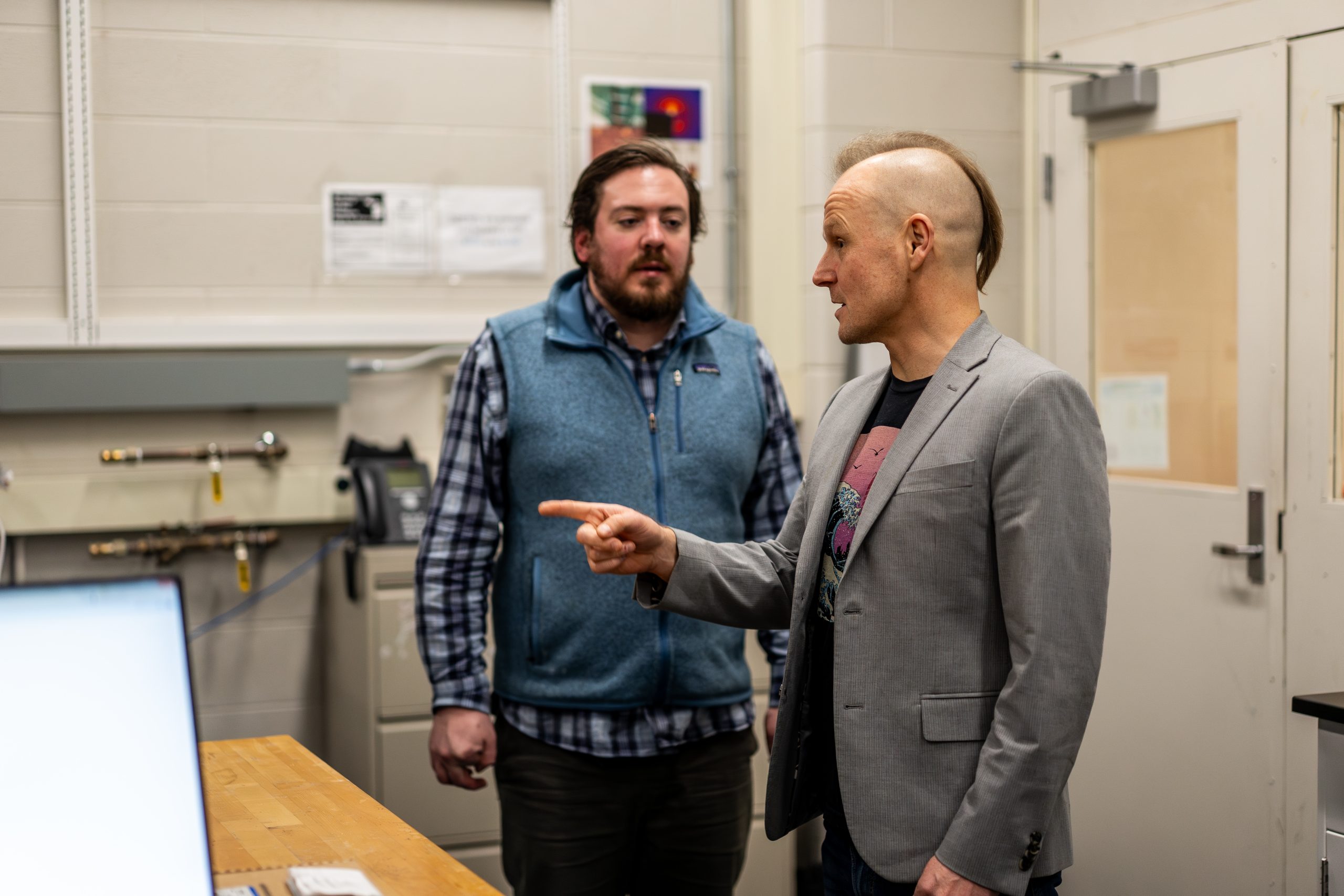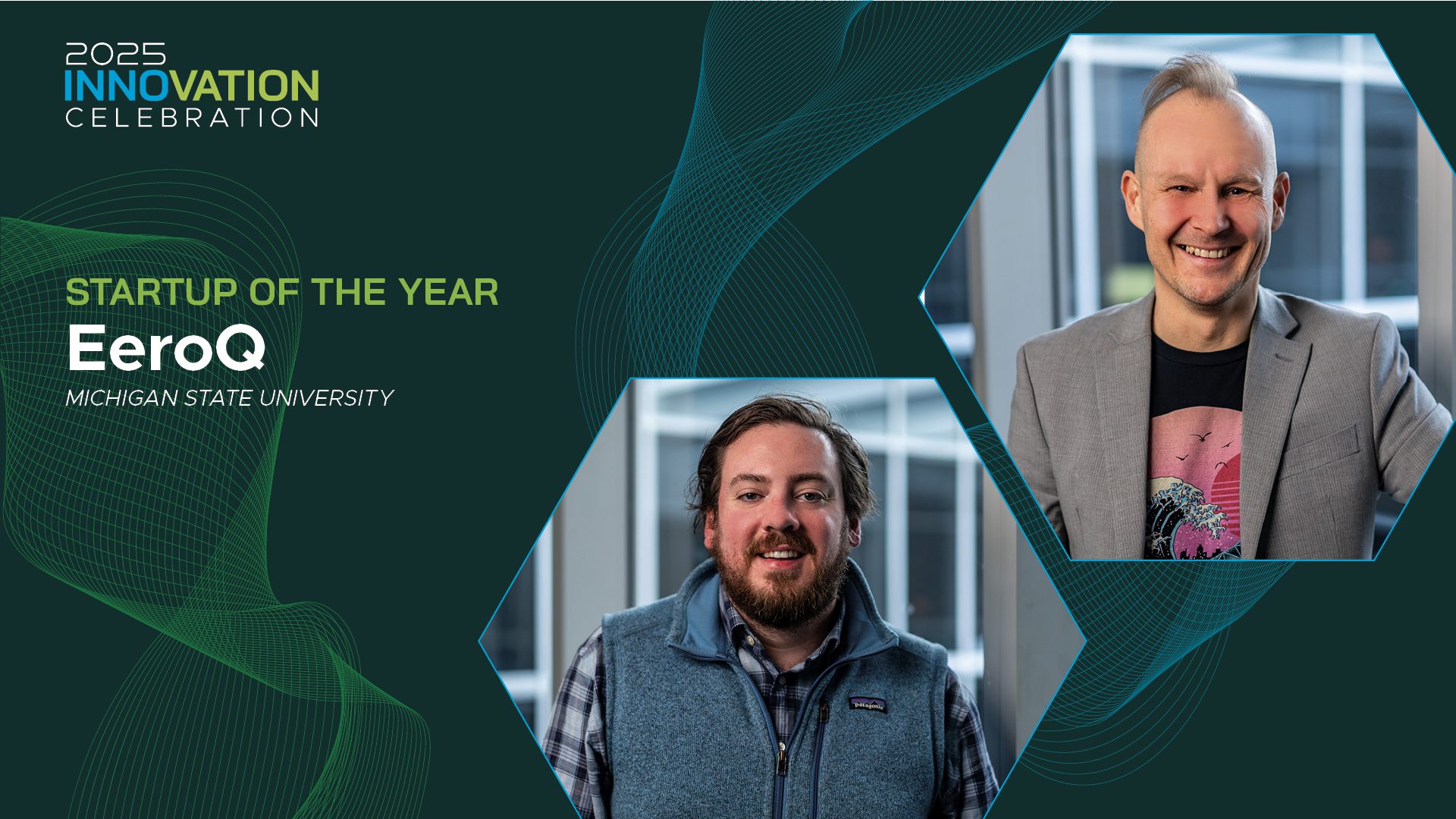There are currently less than ten different ways to build a quantum computer, each having the potential to revolutionize problem-solving across industries. While major corporations such as Google, Amazon, Microsoft, and IBM pursue quantum advancements using traditional models, a Michigan State University (MSU) startup is forging a new path. EeroQ (pronounced “Arrow Q”), winner of this year’s Startup of the Year Award, is leveraging a groundbreaking method that promises faster, more scalable quantum computing—potentially outpacing artificial intelligence in tackling global challenges.
Founded by MSU Physics and Astronomy Associate Professor Johannes Pollanen, EeroQ builds upon research pioneered over two decades ago by MSU Professor Mark Dykman. EeroQ’s patented quantum computing chip design offers the ability to fit millions of electrons on a single chip to help people develop solutions across a broad range of fields, from health care to aerospace.
The Promise of Quantum Computing
Unlike classical computers that use binary bits (0 or 1), quantum computers operate using qubits in a state of “superposition,” allowing them to process exponentially more information.
“This gives us exponentially more computing power beyond anything possible with traditional binary systems,” explains Nicholas Farina, Chief Executive Officer of EeroQ. “No matter how advanced AI becomes, it cannot match the power of quantum computing, because once you start going beyond zeros and ones, you are in an entirely new realm of computing power.”
EeroQ’s approach to quantum computing utilizes a single electron floating on superfluid helium—a unique method with significant advantages. Helium, a gas at room temperature, transitions into a liquid state when cooled to -495 degrees Fahrenheit. Within a copper cell, electrons are introduced (using tungsten filaments purchased from a model train store), forming a system of interacting qubits and laying the foundation for quantum operations. 
This approach offers a promising roadmap for rapid scalability, making commercial quantum computing a nearer reality. “By using electrons floating on superfluid helium and leveraging existing chip fabrication technology, EeroQ offers a scalable, high-fidelity approach to quantum computing with long coherence times and high qubit connectivity,” says Brad Fingland, Director of Venture Creation for the MSU Research Foundation. “This innovation allows for millions of qubits on a single chip, overcoming many challenges other quantum systems face.”
An Innovation with Deep Roots at MSU
The basic technology was originally proposed as a theory in the journal Science in 1999, co-authored by Dykman and the late Phil Platzman. However, the concept remained unexplored for years due to a lack of resources. It wasn’t until 2016 that funding and research efforts reignited interest in bringing the theory to life, culminating in Pollanen’s involvement.
MSU was crucial in supporting EeroQ’s development, from conceptualization to commercialization. “MSU made this innovation possible on multiple fronts,” says Farina. “An MSU professor developed the theory; another conducted the experimental research, bringing it to life using experimental physics and engineering,” he says, noting the extent of support provided by MSU’s innovation ecosystem, from fabrication facilities to providing crucial startup funding through Red Cedar Ventures, the former investment arm of the MSU Research Foundation.
Additionally, MSU’s technology transfer initiatives helped structure an agreement that benefited both the university and the startup.
Supporting MSU’s Faculty Entrepreneurs
Entrepreneurship assistance in the MSU ecosystem encompasses many programs. For example, MSU’s Venture Postdoc program helps faculty by identifying post docs who will transition into leadership roles within their startups. At the same time, the MSU Research Foundation provides funding, mentorship, and commercialization training through initiatives such as Strategic Partnership Grants, Conquer Accelerator, and Michigan Rise.
The MSU entrepreneurial ecosystem prides itself on helping faculty navigate the journey from research to commercialization. The resources and expertise MSU invests in its faculty are critical as they develop and scale their technologies into successful startups like EeroQ, says Fingland.
That support also includes early-stage funding through programs like Strategic Partnership Grants and Targeted Support Grants for Technology Development; Michigan Economic Development Corporation cofunded ADVANCE and MTRAC programs; commercialization-focused training via the Venture Postdoc program; mentorship from industry experts through the Mentor-in-Residence program; leadership sponsorship via the Entrepreneur-in-Residence program; venture programming and education through Conquer Accelerator initiatives; venture capital investment at every stage, from pre-seed to Series A, through Red Cedar Ventures and Michigan Rise subsidiaries; business infrastructure including lab and office spaces. These programs are the result of the collaborative efforts by the MSU Innovation Center, MSU Technologies, Business Connect and the MSU Research Foundation.
“Together, these resources create a robust ecosystem that reduces the challenges of entrepreneurship and increases the likelihood of success for MSU-based startups,” says Fingland.
A Bright Future Ahead for EeroQ
Since its 2016 launch, EeroQ has secured over $13.5 million in venture funding, moving its novel quantum computing model closer to real-world application. The impact of this technology could be profound. “EeroQ’s quantum computing technology has the potential to revolutionize industries by enabling faster, more complex problem-solving in fields like biomedical research, climate modeling, and materials science,” says Fingland. “With its unique design, strong leadership, and technical expertise found at MSU, EeroQ could accelerate the commercialization of quantum computing hardware and drive breakthroughs with global impact.”
While quantum computing won’t cure cancer overnight, its potential is undeniable. “We’re in this for the long game,” says Farina. “As we build larger quantum computers, they’ll be able to tackle disease, climate change, and next-generation materials for lighter, more efficient vehicles and batteries.”
Quantum computing’s nearly limitless potential could benefit nearly every industry. “We already know how to create the future—we’re just held back by computing power,” says Farina. “Quantum computing will break those limits, delivering the computational ability that classical systems never could. That’s what excites me the most.”
Winning Startup of the Year is a special honor for EeroQ that recognizes the long journey that started at MSU, says Farina. “I remember scribbling ideas on a napkin about structuring an agreement with MSU,” recalls Farina. “Seeing those notes evolve into an award-winning company is surreal, honestly.”
“This recognition isn’t just for EeroQ—it’s for all the people at MSU and MSURF who helped us along the way: Brice Nelson, Raymond DeVito, Brad Fingland, Jeff Wesley, John Tran, Tommy Skinner, David Washburn, and Randy Cowen. Without MSU’s unwavering support, we wouldn’t be here today.”
The MSU Innovation Center is seeking companies and organizations interested in quantum computing, advanced chip design, and breakthrough computational technologies.
Whether you’re exploring sponsored research, licensing opportunities, or co-developing quantum processors, superfluid helium-based systems, or next-generation computing hardware innovations, we’re ready to collaborate.
Interested in partnering with MSU faculty on quantum physics research and next-generation computing solutions?

